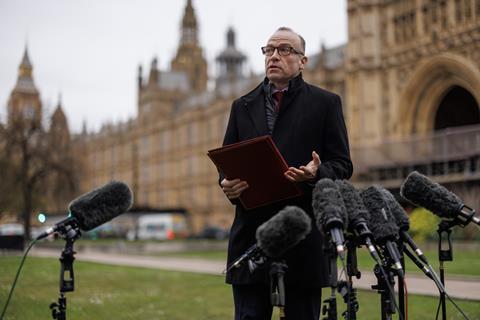
Northern Ireland’s Democratic Unionist Party has finally accepted a post-Brexit trade deal that had caused a political deadlock in Stormont for two years.
Power-sharing is set to be restored after it collapsed in February 2022, when the DUP protested post-Brexit trading arrangements between the UK and the EU – also known as the Windsor Framework, which replaced the previous NI protocol.
Northern Ireland secretary Chris Heaton-Harris said this morning he “didn’t believe” the Windsor Framework would have to be renegotiated with the EU as part of talks with the DUP.
However, he warned of “significant changes” to the current arrangements during a press conference at Westminster.
Traders currently rely on the Windsor Framework’s green lane and red lane system, which sees GB goods meant to stay in NI face little to no checks or paperwork, while goods heading south of the border face more burdensome and costlier red tape.
However, some British food goods sold in Northern Ireland that are considered higher-risk, such as meat and dairy, need to carry a ‘not for EU’ label when making it to the shelves there as part of the deal with the bloc. This has increased costs for British food producers exporting to NI.
When asked about the changes and whether they would result in fewer or no checks between Great Britain and Norther Ireland – a claim previously made by DUP leader Sir Jeffrey Donaldson – Heaton-Harris said they would be explained in greater detail tomorrow.
“I will tomorrow publish the details of the proposals we have made to secure Northern Ireland’s place in the UK internal market and to strengthen the union. I believe that all the conditions are now in place for the assembly to return.”
He added he had achieved “a vast array of decent improvements to make sure our internal market works properly, as it should do”.
Read more: What the Windsor Framework really means for food businesses
Food & Drink Federation CEO Karen Betts warned it was “critical” to food and drink businesses that any deal between the government and the DUP did not cause “unnecessary costs to manufacturers and, ultimately, to consumers across the UK – particularly when households are already grappling with a cost of living crisis”.
The trade body is still awaiting more detail from government on what the deal means for food and drink traders, as they are some of the businesses most affected by the Windsor Framework.
It previously called for proposals to make ‘not for EU’ labelling on products compulsory across the UK, rather than just in Northern Ireland, from October this year to be scrapped.
This would mean British producers exporting to both Northern Ireland and other countries would need separate production lines at significant costs, the FDF said.
“The impact and costs of requiring ‘not for EU’ labelling on products sold right across the UK, not only in Northern Ireland, would be significant,” Betts reiterated today.
“We estimate the costs would run into hundreds of millions of pounds. Manufacturers could be forced to reduce the number of products they sell in the UK and food and drink exports are likely to fall, particularly those produced by SMEs.”
Michael Bell, executive director at Northern Ireland Food and Drink Association (NIFDA), said in response to the recent Stormont developments:
“As an industry supporting 113,000 jobs in local communities across Northern Ireland, we have always held the view that the best decision making we can have is through a functioning Northern Ireland Executive.
”We welcome the renewed impetus to restore the Stormont institutions, and are hopeful that after two years we will soon see ministers in place.
“From addressing the competitive disadvantage Northern Ireland food and drink companies face in terms of capital investment, to maximising the opportunity of our unique trading position, there is much work to be done to equip our industry to grow even further, and boost the local economy in the process.
“We look forward to engaging with our MLAs in the weeks and months ahead, to support fully informed decision making and address the challenges we collectively face.”



















No comments yet